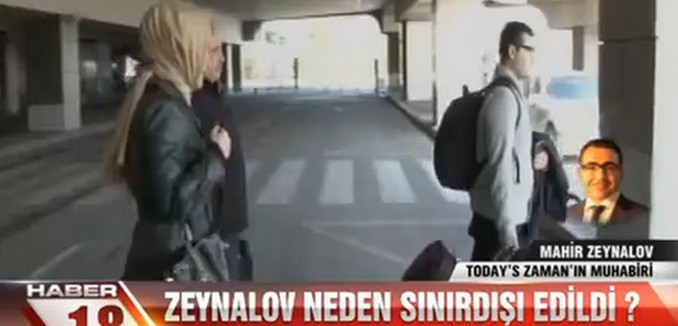Turkey under Prime Minister Recep Tayyip Erdogan has developed something of a reputation – emphasized in what has become an annual tradition of watchdog criticism – for being the world’s top jailer of journalists. Turkey’s legislature recently passed a law institutionalizing mass censorship and surveillance of the Internet, triggering State Department “concerns” over freedom of expression. The moves come amid deepening fears that Erdogan’s Justice and Development Party (AKP) are seeking to systematically undermine freedom of speech.
Zeynalov told Al Arabiya News that the decision to deport him came weeks after a smear campaign against him both on social media and the pro-government media, with “many of them vowing that I will be deported… The notice to deport says my residence permit expires last month whereas I have a legal right to stay in Turkey until March 10. I am also married to a Turkish citizen, which gives me a permission to stay and work in Turkey,” Zeynalov added in an email statement after he left Turkey.
The institutionalization of anti-speech regulations has put Turkey at odds with, among other actors, the European Union. The new measures regarding the Internet drew criticism from the E.U., which Turkey has been trying to join for decades. A Google transparency report published last December had already described Turkey, on the basis of a previous 2007 law, as China’s equal in web censorship.
The most recent moves are being read against the backdrop of an on-going corruption scandal that long ago slipped into open warfare between Turkey’s two largest Islamist factions. Lebanese outlet Ya Libnan last month assessed that the AKP was attempting to “increase control over [I]nternet access at a time when the government is also tightening its grip on the country’s legal institutions.” It noted that the regulations seemed very much like “part of a general trend in which the government of [Prime Minister] Recep Tayyip Erdogan… is concentrating more power” against judiciary figures linked to U.S.-based cleric Fethullah Gulen, who had launched and were at the time widening a corruption probe that has ensnared AKP elites (the AKP for its part has purged hundreds of police and judicial officials).
Veteran international journalist Frida Ghitis already noted in January that “the myth of the all-powerful, universally loved prime minister had started to look like a hollow personality cult” and that “the coalition on which he built his support has started falling apart,” and even The New York Times had seen enough:
Turkey’s prime minister, Recep Tayyip Erdogan, was in Brussels last week seeking to repair relations with Europe, but the first place to look for a solution is within himself. Once hailed as the leader of a model Muslim democracy, he has created a political disaster at home, transforming Turkey into an authoritarian state that poses dangers not just for itself but for its allies in NATO, including the United States.
[Photo: Bugün TV / YouTube ]




